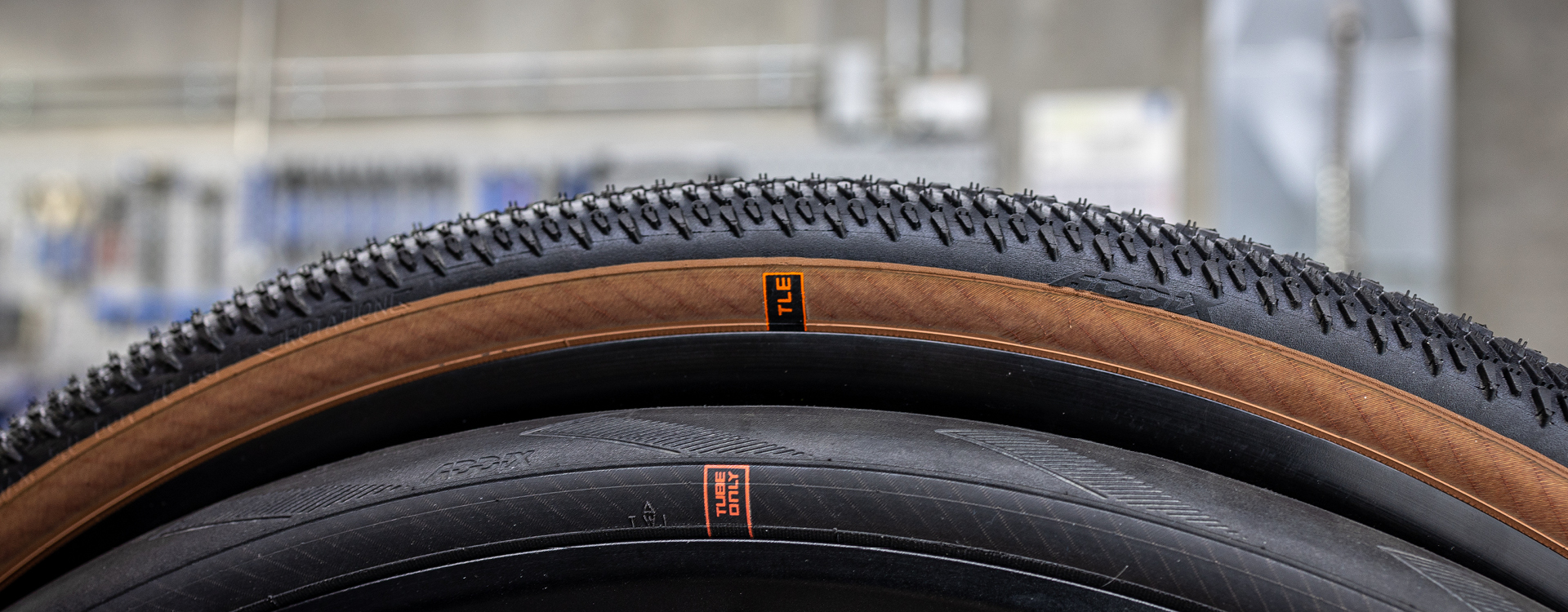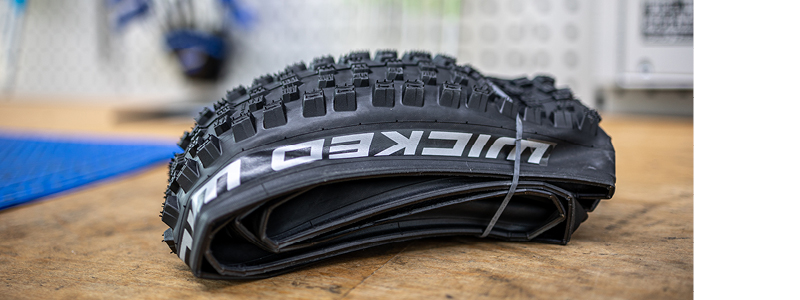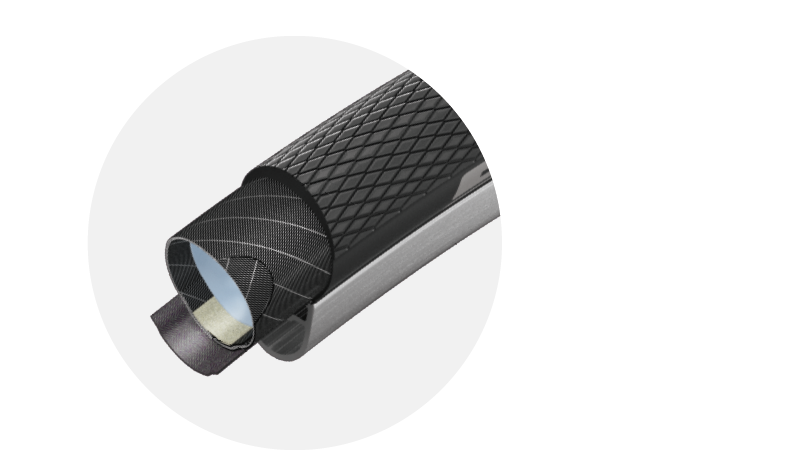TIRE TYPES
WHAT IS A CLINCHER TIRE?
Today clincher tires are standard for bicycles. See Tire Construction. The wire bundle in the tire bead prevents the tire from expanding with the pressure and thus from jumping off the rim. Clincher is the international designation for this type of tire.
WHAT IS A FOLDING TIRE?
A folding tire is a special version of the clincher tire. The wire bundle is replaced by a bundle of Kevlar strands. This enables the tire to be folded up and depending on the tire size, makes it approx. 50-90 g lighter.
WHAT IS A TUBULAR?
In a tubular tire, also referred to as Tub or Collé, the tube is sewn directly into the tire. The tire is then glued onto a special rim.
Many professional road racers still swear by them, claiming that they provide a better “feeling” and that the tires have more “life”, i.e. better comfort and smoother cornering. At least with regard to rolling resistance, this assumption is now outdated. Modern folding tires have certainly caught up with tubular tires in terms of rolling resistance and roll even easier.
However, a clear advantage of tubular tires lies in their run-flat capability. Even with a flat, the tire stays on the rim. The rider can safely stop without losing control of the bicycle, or even slowly ride on until the team car arrives.
Tubular tires are an option to reduce weight on a wheel. As a tubular tire rim does not need pressure retaining sidewalls, it is easier to construct. The tubular tire itself weighs approximately the same as a folding tire and its tube.
The drawback of tubular tires is its fitting. Sticking the tire onto the rim with glue is much more awkward than fitting a clincher tire. Furthermore, the tubular tire cannot be repaired easily like a tube. Smaller defects can be repaired with a puncture protection liquid. Otherwise, the entire tubular tire must be changed. Also, the manufacturing process is more labor intensive.
That is why top quality tubular tires are so expensive.
WHAT IS A TUBELESS TIRE?
As the name implies the tubeless system needs no tube. The tire and the rim are made in such a way that fitting them together provides an airtight seal. Special tires and rims are necessary.
We at Schwalbe are convinced however: Tubeless is the tire technology of the future. When it comes down to best performance on the bike, the tubeless technology brings clear advantages, no matter whether MTB, road bike or touring bike. For all ambitious cyclists tubeless is the right choice.
Tubeless tires provide clear advantages in speed, comfort, grip and puncture protection. They avoid unnecessary friction between tires and tubes, which reduces the rolling resistance even more than with super light competition tires. Tubeless tires can be used with a lower inflation pressure without compromising performance. That brings clear advantages in comfort as well as clearly more control in critical situations and on trails with poor surfaces. At the same time, tubeless systems provide a high puncture protection. The danger of blowouts is clearly reduced. A sudden loss of air pressure caused by a burst tube or a valve tear off is excluded. What is more, tubeless systems function perfectly together with puncture protection liquids. Punctures are re-sealed within milliseconds.
WHAT DOES TUBELESS READY OR TUBELESS EASY MEAN?
Tubeless Ready tires are not tubeless tires. By using sealing liquid in a special process they can, however, be converted into tubeless tires. Schwalbe Tubeless Ready tires have a coated tire bead which has a special shape. This provides a good sealing with the rim and a perfect fit.

Tubeless Easy is the standard for state-of-the-art MTB tires from Schwalbe (Evolution Line). Tubeless Easy has replaced the existing tubeless tires as well as the Tubeless Ready design.
WHAT IS THE DIFFERENCE COMPARED TO NORMAL TIRES?
The conversion from normal tires into tubeless tires is something road racers have been practicing for quite a long time. With the Schwalbe Tubeless Ready and Tubeless Easy tires this conversion is significantly easier. The special tire bead provides an immediate sealing with the rim and a perfect fit. In the case of normal tires the sealing in the area of the rim is very problematic, as it often works only by using a compressor and takes a lot of patience. Often, it takes several days until this transition area is actually sealed. There is also an increased risk of the tire coming off, as the tire cores are not designed for being used as tubeless tires.
Due to the necessary high inflation pressure for a road bike, it is absolutely impossible to convert classic tires to tubeless tires. A normal tire bead will not withstand these forces and the tire will almost certainly come off. Be sure to only use tires which are designed for tubeless fitting!
THIS MIGHT ALSO BE OF INTEREST FOR YOU
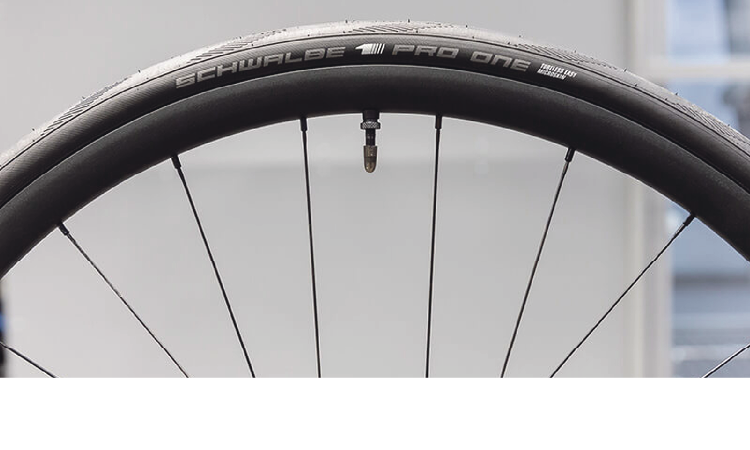
THE ADVANTAGES OF TUBELESS
Tubeless tires offer clear advantages in terms of speed, comfort, grip and puncture resistance. Unnecessary friction between tire and tube is avoided. As a result, rolling resistance is significantly lower than with folding tires or tubular tires. Tubeless tires can be ridden with a lower air pressure without any loss of performance. This brings advantages in terms of comfort but also more control in critical situations and on bad roads. At the same time, tubeless systems offer high puncture resistance.
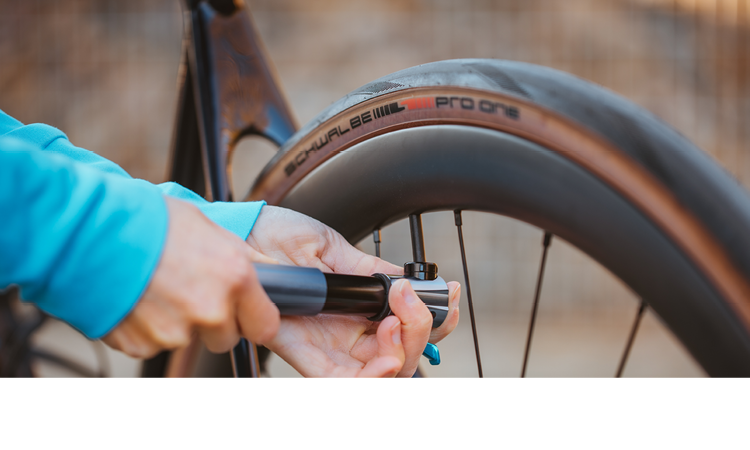
WHY IS INFLATION PRESSURE SO IMPORTANT?
Have you ever wondered why the inflation pressure of your bicycle tires is so important? It not only helps to minimize punctures, but also to reduce rolling resistance. But how often should you check the inflation pressure? Which tools can help you do this? And how do you find the optimum pressure for your weight? Find out the optimum inflation pressure for your bike tire.

